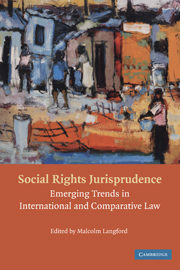Book contents
- Frontmatter
- Contents
- Foreword – Philip Alston
- Preface
- PART ONE OVERVIEW
- PART TWO SELECT NATIONAL JURISDICTIONS
- PART THREE REGIONAL PROCEDURES AND JURISPRUDENCE
- 17 African Regional Human Rights System
- 18 The Inter-American Commission on Human Rights
- 19 The Inter-American Court of Human Rights
- 20 European Court of Human Rights
- 21 The European Committee of Social Rights
- 22 European Court of Justice
- PART FOUR INTERNATIONAL HUMAN RIGHTS PROCEDURES AND JURISPRUDENCE
- PART FIVE SPECIAL TOPICS
- Notes on Contributors
- Table of Authorities
- Index
- References
17 - African Regional Human Rights System
The Promise of Recent Jurisprudence on Social Rights
Published online by Cambridge University Press: 05 June 2012
- Frontmatter
- Contents
- Foreword – Philip Alston
- Preface
- PART ONE OVERVIEW
- PART TWO SELECT NATIONAL JURISDICTIONS
- PART THREE REGIONAL PROCEDURES AND JURISPRUDENCE
- 17 African Regional Human Rights System
- 18 The Inter-American Commission on Human Rights
- 19 The Inter-American Court of Human Rights
- 20 European Court of Human Rights
- 21 The European Committee of Social Rights
- 22 European Court of Justice
- PART FOUR INTERNATIONAL HUMAN RIGHTS PROCEDURES AND JURISPRUDENCE
- PART FIVE SPECIAL TOPICS
- Notes on Contributors
- Table of Authorities
- Index
- References
Summary
INTRODUCTION
The adoption of the African Charter on Human and Peoples' Rights (‘African Charter’) in 1981 marked the introduction of a third regional human rights system after the creation of the European and Inter-American systems respectively. Adopted partly due to external pressure on African governments to establish a regional human rights regime and partly as a response to the gross human rights violations committed by some African leaders, the African Charter is distinctive in its attempt to append an African ‘fingerprint’ on the human rights discourse. Not only did its content draw on existing international and regional human rights treaties, the drafters of the African Charter were mandated to have regard to the values of African civilisation and the needs of Africa in formulating the Charter.
One of the unique features of the African Charter is the recognition of economic, social and cultural rights on the same footing as civil and political rights. The Charter, as will be shown below, prescribes the same enforcement mechanisms for all the rights it recognises. While much of the litigation that it has generated concerns civil and political rights, some interesting jurisprudence on socio-economic rights has begun to emerge. This chapter analyses critically the protection of socio-economic rights in the African regional system focussing mainly on the African Charter and the jurisprudence of the African Commission on Human and Peoples' Rights (‘African Commission’).
- Type
- Chapter
- Information
- Social Rights JurisprudenceEmerging Trends in International and Comparative Law, pp. 323 - 338Publisher: Cambridge University PressPrint publication year: 2009
References
- 3
- Cited by

